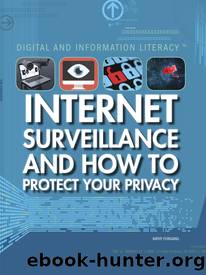Internet Surveillance and How to Protect Your Privacy by Kathy Furgang

Author:Kathy Furgang
Language: eng
Format: epub
Publisher: The Rosen Publishing Group, Inc
Spyware and adware are types of malware, or harmful computer software. Spyware is software that allows someone to obtain information about another computer secretly by taking it from the hard drive. Spyware can track the keystrokes you make. This reveals passwords and other personal or valuable information.
Spyware can also change your computer settings. This may make your computer work very slowly or redirect your searches. It can even keep you from connecting to a network entirely.
Making your computer secure from malware and other intrusions into your privacy is like locking it up for safety.
Most people get spyware attached to their computers by downloading software that they wanted for their computer. The spyware will enter the computer through the installation process. It begins infecting the computer at once. Sometimes the malware is even attached while people install security software meant to protect the computer. While PC computers are more likely to be infected with spyware than Mac computers, all types of computers have been known to be infected.
Make sure you only download software from a trusted site, such as the website of the company that makes the software. Before you download, read any user agreements to look for language about information gathering. Also, be especially careful about downloads for antispyware programs. These programs might ask you to click on a button to start a scan for spyware. Next they might tell you to download a product to fix the spyware they find on your computer. That ends up infecting it. Use only antispyware programs from legitimate companies. One way to do this is to buy them in a computer store instead of online.
Adware display ads use pop-up windows. These may track your advertising settings in order to focus advertising directly at you. Adware is not usually harmful. Still, many consider it an invasion of privacy. Removing it or preventing it along with spyware is a common practice. It helps to make your computer as safe and streamlined as possible.
Identity Theft
What can someone do with the information gained from malware? One of the most popular uses is identity theft. Identity thieves use the information they find to pose as another person. This includes credit card information along with security questions. It also includes phone numbers, addresses, and Social Security numbers. All of the things are asked for by customer service representatives when you complete telephone or online transactions. Identity theft victims may have a difficult time proving they have been cheated and did not make the transaction. The more people do online, the more important it is to take precautions against identity theft.
Download
This site does not store any files on its server. We only index and link to content provided by other sites. Please contact the content providers to delete copyright contents if any and email us, we'll remove relevant links or contents immediately.
Pale Blue Dot by Carl Sagan(4992)
Cracking the GRE Premium Edition with 6 Practice Tests, 2015 (Graduate School Test Preparation) by Princeton Review(4270)
Pocahontas by Joseph Bruchac(4239)
Unfiltered by Lily Collins(4000)
The Emotionary: A Dictionary of Words That Don't Exist for Feelings That Do by Eden Sher(3348)
The Daily Stoic by Holiday Ryan & Hanselman Stephen(3293)
Factfulness_Ten Reasons We're Wrong About the World_and Why Things Are Better Than You Think by Hans Rosling(3229)
The 48 laws of power by Robert Greene & Joost Elffers(3216)
The Innovators: How a Group of Hackers, Geniuses, and Geeks Created the Digital Revolution by Walter Isaacson(3123)
The President Has Been Shot!": The Assassination of John F. Kennedy by Swanson James L(3085)
Sapiens and Homo Deus by Yuval Noah Harari(3057)
Rogue Trader by Leeson Nick(3039)
Gettysburg by Iain C. Martin(2826)
The Rape Of Nanking by Iris Chang(2805)
Almost Adulting by Arden Rose(2692)
The Plant Paradox by Dr. Steven R. Gundry M.D(2599)
In the Woods by Tana French(2579)
500 Must-Know AP Microeconomics/Macroeconomics Questions(2556)
Make by Mike Westerfield(2317)
